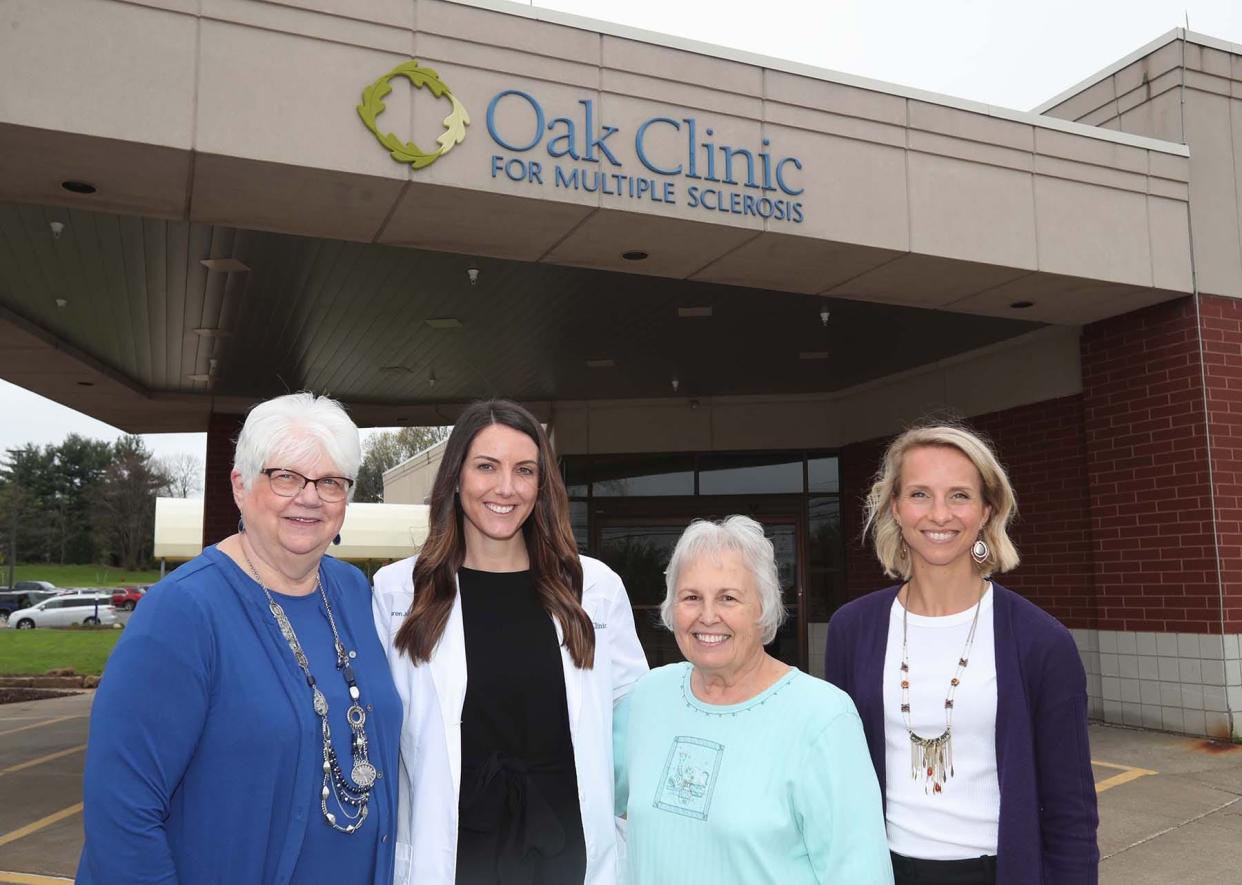Unique Green clinic encourages patients to combat MS symptoms with diet, exercise

A private, non-profit multiple sclerosis center tucked away in Green has won a nationwide grant to continue a diet-based therapy for the insidious disease.
The $5,000 Nightingale Award is a project of the International Organization of Multiple Sclerosis Nurses, designed to help nurses specializing in the disorder continue innovative treatment approaches. It’s funded by EMD Serono, the U.S. arm of Merck KGaA, Darmstadt, Germany, and went to nine recipients scattered across the United States.
Although the grant may seem relatively small, it's a big deal to the Oak Clinic for Multiple Sclerosis and its 1,800 patients in Northeast Ohio and beyond, said practicing nurse Lauren Junk, who applied for the grant.
“It really helps,” Junk said in a recent interview at the clinic. “With the award, we’re able to keep it at no cost for patients.”
Junk helped develop the Wellness Wednesday program as one component in the clinic’s treatment regimen, which combines traditional medical approaches with diet and exercise modifications.
The holistic perspective helps patients deal with an often unpredictable disease that can become debilitating.
The clinic was established in 2000 by Jim and Vanita Oelschlager, who wanted a place for multiple sclerosis patients to find help in fighting the disease regardless of their ability to pay.
Jim Oelschlager himself was diagnosed with multiple sclerosis in 1973, when little was known about the disease and it was difficult to diagnose. Vanita Oelschlager has written a children’s book about multiple sclerosis, with profits going to the Oak Clinic.
“It’s probably the only clinic left in the U.S. that’s not affiliated with a medical facility,” said Suzanne Arnold, the clinic's developmental director.
That independence helps the clinic maintain its focus on patients while conducting research and developing innovative treatment and coping strategies for multiple sclerosis, she said.
An unpredictable disease
Although multiple sclerosis has been known as a unique disorder for more than 150 years, effective treatment has been relatively recent. There is no cure.
Development of magnetic resonance imaging in the late 1970s helped identify the unique damage caused by MS, supplanting lumbar punctures as a definitive test for diagnosing the disease.
Pharmaceutical treatments also developed slowly, but several now are available with others in the development stage.
It's a disease that affects about a million Americans, and the estimates of those with MS is on the rise. A 2019 study estimated about 363 of every 100,000 Americans have multiple sclerosis, up from 309 for 100,000 in 2010.
At Oak Clinic, about 350 to 400 patients receive monthly injections to help relieve symptoms, which can include blurry and double vision, numbness in the legs, spasms, fatigue, depression, incontinence issues, sexual dysfunction and walking difficulties.
In its advanced stages, it can lead to able to an inability to speak, write or walk, and some patients may need dedicated care to meet their needs. It is only fatal in extremely rare cases.
'Nobody could figure out what was going on'
At Oak Clinic, Junk said, patients are encouraged to modify their diets and exercise routines to help alleviate some symptoms of the disease.
The Wellness Wednesday program may not seem revolutionary, but it has had a profound effect for some patients.
Salem resident Elaine Reiter, a patient at the Oak Clinic for several years, said changes introduced by clinical dietician Chelsey Jackson have been beneficial.
“I had MS before MRIs came in,” she said. “Nobody could figure out what was going on. The doctors didn’t believe [me].”
Reiter said she had an opportunity to travel overseas but was concerned about her stamina for the trip.
“I had a chance to go to Romania,” she said. “I didn’t know what was going to happen when I got there.”
To prepare, she lost 20 pounds, avoided processed foods and sugars and exercised.
“I always thought there was a connection to food,” she said. “[I] stay away from processed food. Sugar is the worst thing for us.”
The changes helped Reiter increase her mobility and reduce her fatigue for the trip, she said.
“I don’t eat fast foods any more,” she said. “… All kinds of foods cause inflammation.”
Junk said research seems to indicate a link between MS and deficiencies in vitamin D and sun exposure, as well as exposure to toxins. About two-thirds of MS patients are women, and many with MS symptoms don’t get adequate attention to diagnose their condition.
“A lot of patients just get blown off with the symptoms,” she said. “New patients here get a two-hour visit.”
Jackson said making better food choices – healthy plant-based foods and avoiding processed foods – help many MS sufferers.
Jackson recently challenged patients to a 10-day sugar detox.
“It was amazing to hear the stories of how much better people felt,” she said.
Leave a message for Alan Ashworth at 330-996-3859 or email him at aashworth@gannett.com. Follow him on Twitter at @newsalanbeaconj.
This article originally appeared on Akron Beacon Journal: Green clinic gains grant, recognition for multiple sclerosis program

